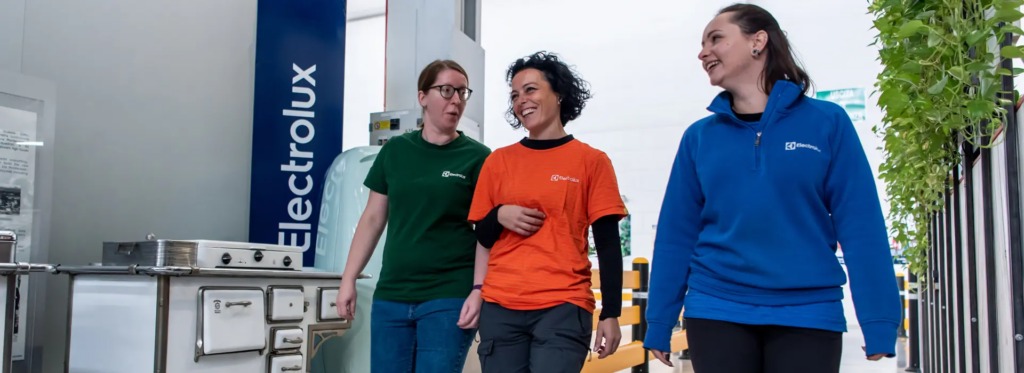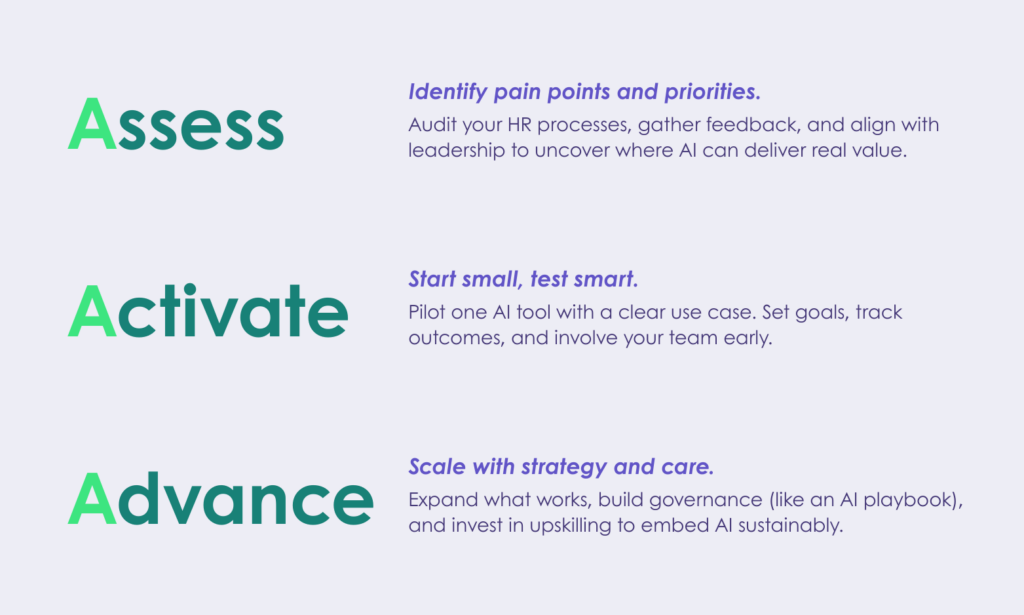Introduction
Artificial intelligence is rapidly reshaping the HR landscape—streamlining admin tasks, enabling smarter decision-making, and personalising employee experiences at scale. But with growing adoption comes growing responsibility. The real challenge for HR teams isn’t whether to use AI—it’s how to use it without losing the human connection.
This article draws on expert insights shared in a recent Avado webinar, featuring Katie King—one of the UK’s Top 10 AI influencers, TEDx speaker, and advisor to HR leaders and the UK Government’s AI Taskforce. Katie shared real-world case studies and a practical framework to help HR professionals adopt AI ethically, effectively, and empathetically.
AI in HR Is Here—But People Must Stay in Focus
AI is already changing the way HR works—automating repetitive tasks, revealing workforce trends, and personalising employee experiences at scale. According to the World Economic Forum, AI and automation are expected to create a net increase of 78 million jobs globally by 2030.
(Explore: 14 Best AI Tools for HR: Recruitment, Performance, Automation and L&D)
However, based on Avado’s survey, only 8% of human resources professionals have fully integrated AI into their roles.
As Katie King reminds us, though, it’s not just about the technology:
“AI won’t replace HR professionals—but HR professionals using AI will replace those who don’t evolve.”
This shift requires more than new tools—it calls for new mindsets, ethical frameworks, and a clear focus on people. AI in HR must be inclusive, transparent, and designed to empower—not replace—the human element.
Real-World AI in HR: How Leading Companies Are Making It Work
So, what does effective implementation look like? During the webinar, Katie shared powerful examples of human resource AI delivering measurable value across different industries.
Just Eat
Cutting Recruitment Time in Half
To move away from traditional CV screening, food delivery company Just Eat adopted HireVue’s AI-powered chatbot, enabling skills-based hiring at scale. The chatbot handled screening questions and cognitive ability assessments, dramatically reducing manual workload.
Result: Recruitment time dropped by 50%, from 14 days to just 7—while enabling recruiters to focus more on candidate engagement.

Shell
Personalised Onboarding Through Microlearning
With over 86,000 employees in 70+ countries, Shell needed an onboarding solution that could flex across geography, skill level and experience. They introduced an AI-enabled mobile training app that delivered tailored microlearning 24/7, gamified to encourage completion.
Results: The average course completion rate exceeded 75%, and learners demonstrated a nearly 30% increase in knowledge retention—showing how AI can support both scale and personalisation in L&D.

Electrolux
Transforming Talent Acquisition
Faced with a talent shortage, Electrolux digitised its talent acquisition process with an AI platform offering fit scoring, candidate matching, and one-way video interviews.
Result: Application conversation rates jumped by 84%, incomplete applications dropped by 51%, and the use of one-way interviews reduced recruitment time by 20%. Overall, AI scheduling saved the team 78% of the time typically spent on coordination—making the hiring process faster, smoother, and more candidate-friendly.

Artesian (now FullCircl)
Enhancing Support with Conversational AI
B2B SaaS provider Artesian launched “Arti,” a conversational AI assistant designed to support both internal teams and customers. In its first month alone, Arti handled more than 3,500 questions across over 1,000 sessions with 750 unique visitors from 60+ organisations.
Result: Over the first year, it helped boost monthly website traffic by 11%, responded to enquiries from 65 countries with 99.1% accuracy, and expanded Artesian’s prospect pool by fourfold—demonstrating the power of AI to scale support and engagement.

Why the Human Touch Still Matters
Despite its growing role, AI in HR comes with risks—especially when implemented without care. Automated systems that reject candidates without explanation. Onboarding journeys lacking a personal welcome. Chatbots that feel transactional instead of supportive.
A Pew Research Center study found that 43% of people believe AI would perform worse than humans at judging empathy and communication—traits essential to effective people management.
This concern resonated with one attendee from a previous Avado webinar: a senior HR leader at a specialist children’s care centre. For them, hiring isn’t just about ticking boxes—it’s about finding individuals who can emotionally support vulnerable children. “No algorithm,” they noted, “can judge compassion or calm under pressure.”
As Katie King mentioned during the session:
“We must avoid the trap of dehumanising HR. AI should enhance empathy, not erase it.”
Used responsibly, human resource AI should empower people professionals, not replace them. It should automate what doesn’t require emotional intelligence—and preserve space for what does: connection, coaching, inclusion, and culture.
The 3A Framework: A Practical Path to AI Adoption in HR
To help HR teams get started, we’ve distilled Katie’s practical advice into a simple, actionable framework: Assess, Activate, Advance—a clear path to adopting AI in HR with confidence and care.

Stage 1: Assess
Start by identifying a clear challenge—not a tool. Run a mini audit. Where are people losing time? Where’s the experience breaking down? Engage leadership and IT early, and define the outcome you want to improve.
Stage 2: Activate
Pilot one solution—like a chatbot or learning platform—in a small, controlled area. Set goals (e.g. time saved, satisfaction scores), gather feedback, and refine the experience. Communicate openly to build trust and alignment.
Stage 3: Advance
Once the pilot proves value, expand—but embed governance. Develop an internal AI policy. Monitor fairness and performance. Upskill the HR team to work confidently with AI, not just around it.
A Story in Practice: Fixing Onboarding with AI
Let’s see the framework in action.
Sarah, Head of People at a growing UK tech firm, was struggling with inconsistent onboarding. Managers forgot key steps. New joiners felt lost. HR was buried in repeat questions.
Assess: Sarah ran an audit and surveyed recent hires. The gaps were clear: information overload, delays, and a lack of human touchpoints. She proposed a digital onboarding assistant and got buy-in from IT and legal.
Activate: She piloted a conversational AI chatbot with the sales team. It shared welcome messages, guided new hires through policies, and answered FAQs. After 30 days, HR saved hours—and feedback was overwhelmingly positive.
Advance: Sarah expanded the tool company-wide, wrote a usage policy, and trained managers to complement the tech with personal calls. Six months in, onboarding satisfaction was up 22%, and HR had reclaimed 50% of their time.
This is AI in HR done right: ethical, strategic, and always employee-first.

Lead the Future of HR—with Tech and Heart
Artificial intelligence is reshaping HR—but its impact will depend on how we choose to use it. When led by human insight and purpose, AI becomes more than just automation—it becomes a powerful tool for Connection, Inclusion, and Growth.
This is where HR leaders are uniquely positioned to make a difference. You understand people. You understand change. And with the right support, you can ensure that technology serves your workforce—not the other way around.
Because ultimately, AI doesn’t replace the human side of HR. It gives us more time—and more data—to do it better.
Want to Learn More? Start with Avado and CIPD
AI in HR isn’t just about automation—it’s about transformation. As the real-world cases in this article show, when implemented thoughtfully, AI can enhance recruitment, learning, onboarding and internal support. But to truly lead this shift, HR professionals need more than tools—they need the confidence, skills and strategic mindset to apply AI responsibly and effectively.
That’s where Avado’s CIPD-accredited HR and L&D courses come in. Whether you’re just beginning to explore human resource AI or ready to scale adoption in your organisation, our programmes give you the practical knowledge and future-focused skills to lead with impact
And when you join a course, you’ll gain exclusive access to Avado Connect, our digital learning community featuring:
- Monthly expert masterclasses, like the one Katie King delivered
- 1:1 mentorship from experienced HR professionals
- Curated job boards to support your career development
Not ready to enrol yet? Subscribe to our newsletter and get weekly updates on the latest HR trends, digital tools, and expert insights!
 7 min read
7 min read 




